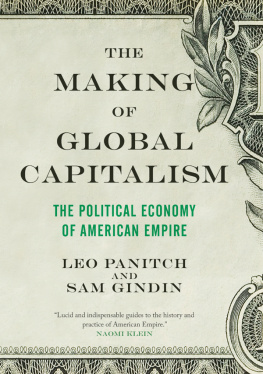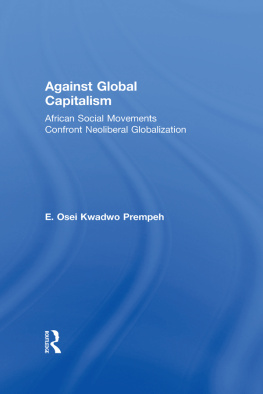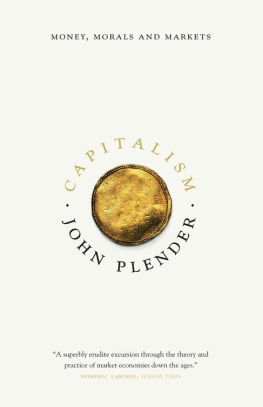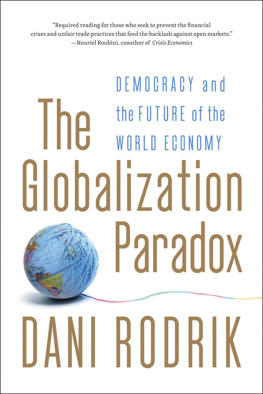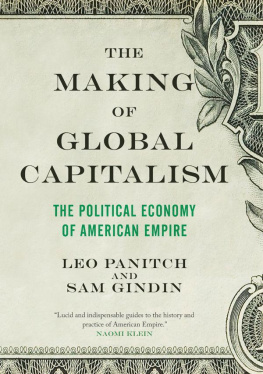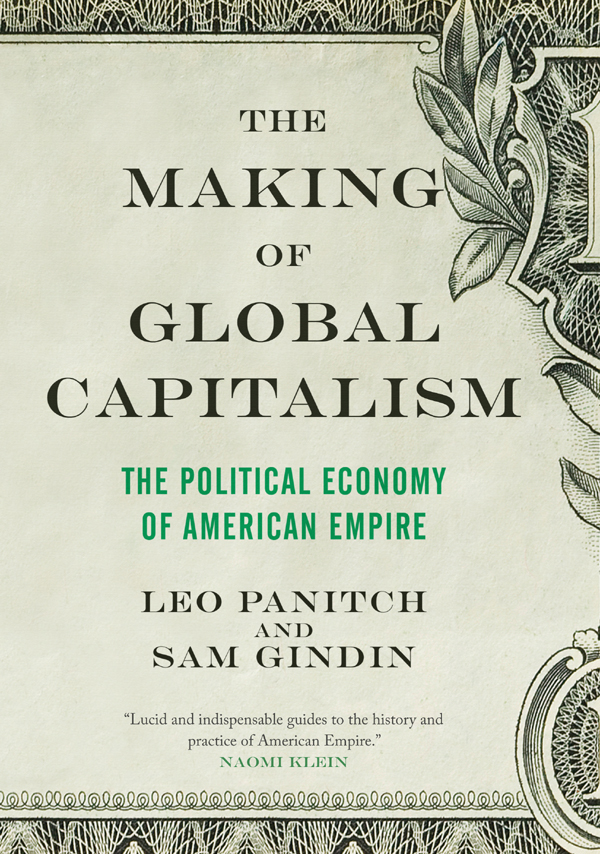
The Making Of
Global Capitalism
The Political Economy
of American Empire
by Leo Panitch and Sam Gindin

To Melanie and Schuster
Contents
This book is about globalization and the state. It shows that the spread of capitalist markets, values and social relationships around the world, far from being an inevitable outcome of inherently expansionist economic tendencies, has depended on the agency of statesand of one state in particular: America. Indeed, insofar as the relationship between the American state and the changing dynamics of production and finance was inscribed in the very process that came to be known as globalization, this book is devoted to understanding how it came to be that the American state developed the interest and capacity to superintend the making of global capitalism. In this respect, this is emphatically not another book on US military interventions; it is about the political economy of American empire. In this quite distinctive imperial state, the Pentagon and CIA have been much less important to the process of capitalist globalization than the US Treasury and Federal Reserve. This is so not just in terms of sponsoring the penetration and emulation of US economic practices abroad, but much more generally in terms of promoting free capital movements and free trade on the one hand, while on the other trying to contain the international economic crises a global capitalism spawns.
The book has itself been a long time in the making. Indeed, it might be said that its origins go all the way back to the close friendship we forged when we were undergraduates together in the early 1960s. This took root in many common interests but especially important was our mutual awareness of how much historical materialism helped us understand the world. We soon came to appreciate this not in terms of unyielding economic laws and the development of a so-called monopoly capitalism, but rather because it revealed how continuing competition and class conflict, and the contradictions to which they gave rise, not only determined but also were determined by the actions of capitalist states. This perspective proved invaluable as we went on to work, one in academe, the other in the union movementalways drawing strength from this enduring friendship over five decades.
It was just over a decade ago that we set out to produce this book, a project in good part made possible by research funds from the Social Science and Humanities Research Council of Canada, and by the respective positions we held since 2001 as the Canada Research Chair in Comparative Political Economy and the Packer Visiting Chair in Social Justice at York University. It seems invidious to single out for thanks here only some colleagues and staff in the remarkable intellectual community that is Yorks political science department. It was there that many of our ideas were generated, and that research reports were first presented and debated, especially at the empire seminar series. The discussions with students in the Globalization and the State graduate course were also extremely helpful. For their especially important contributions to the research teams of graduate students that made our work on this book so productive, particular thanks are due to Martijn Konings, Travis Fast, Ruth Felder, Eric Newstadt and David Sarai; Scott Aquanno, Brad Bauerly, Aidan Conway, Tom Keefer, Adam Schachhuber and Sean Starrs; as well as Khashayar Hooshiyar, Frederick Peters and Angie Swartz.
Apart from stimulating interactions with so many of our colleagues at York whose work overlaps with ours, this book has also benefited from discussions over the years with Giovanni Arrighi, Patrick Bond, Dick Bryan, Vivek Chibber, Jane DArista, Gerard Dumenil, Peter Gowan, John Grahl, David Harvey, Ursula Huws, Gretta Krippner, Michael Lebowitz, Jim OConnor, Fran Piven, Lukin Robinson, William Robinson, Chris Rude, Ellen Russell, Susanne Soederberg and Thomas Sablowskiamong others too numerous to mention. We are above all appreciative of all the contributions that our dear friend Colin Leys made to this book: his close reading, generous praise, sharp criticism and insightful suggestions for each chapter were invaluable. The comments on the manuscript from Greg Albo, Scott Aquanno, Doug Henwood, Martijn Konings, Donald Swartz and Alan Zuege were also very rich, as were those from Adam Hilton and Justin Panos in the course of helping us prepare the final manuscript. The strong interest of Sebastian Budgen and Jake Stevens in publishing the book, and the thorough work of Mark Martin and their other colleagues at Verso in preparing it for publication, also deserve special mention here, as does the creative effort of Anne Sullivan in publicizing it.
Finally, we are grateful for the support of our wives and children over the decade that went into the making of this book. Long before we started working on it, Melanie Panitch and Schuster Gindin often used to say we really should have married each other. There were no doubt times over the past decade they wished we had, but in fact it was their love and encouragement that nourished us each day, even while their impatience to have it over with prodded us on. It is to them this book is dedicated.
Leo Panitch and Sam Gindin
Toronto, May 2012
By the beginning of the twenty-first century, capitalism truly encompassed the world. The fashionable discourse of globalization vaguely spoke to this, yet cogent explanations of what had brought it about were in short supply. This was in good part due to the mistaken notion that, in going global, capitalist markets were escaping, by-passing or diminishing the state. This was seen to be true of all states, even the most powerful among them, including the American state. In showing that the making of global capitalism cannot be understood in these terms, this book seeks to transcend the false dichotomy between states and markets, and to come to grips with the intricate relationship between states and capitalism.
In contrast with those who have emphasized the marginalization of states, our argument is that states need to be placed at the center of the search for an explanation of the making of global capitalism. The role of states in maintaining property rights, overseeing contracts, stabilizing currencies, reproducing class relations, and containing crises has always been central to the operation of capitalism. Far from multinational corporations (MNCs) finding it most convenient to have a world populated by dwarf states or by no states at all, they depend on many states to see to it that these things are done.
The American state has played an exceptional role in the creation of a fully global capitalism and in coordinating its management, as well as restructuring other states to these ends. Although there has also been a certain renewed fashionability of the term empire to designate the United States, the imperial practices of the American state are usually presented as accompanied by economic decline and explained in terms of fending off challenges from rival states.
The insights of an Adam Smith or a Karl Marx into capitalisms DNA have often led people to imagine that globalization is no more than an inevitable outcome of capitalisms structural tendencies to expansion. Yet the spread of capitalism throughout the world was not the automatic result of the operation of any historical law; it was brought about by human agents and the institutions they created, albeit under conditions not of their choice. It has become quite commonplace to praise Marx in particular for recognizing that capitals competitive drive led it to nestle everywhere, settle everywhere, establish connections everywhere, so that in place of the old local and national seclusion and self-sufficiency, we have intercourse in every direction, universal inter-dependence of nations. Rarely quoted, however, has been Marxs no less perceptive insight that, while national barriers are constantly overcome, so are new ones constantly posited.
Next page
